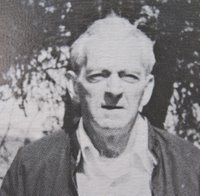Not With a WhimperThe world will end when the poets die. It will end, not with a bang, not with a whimper, but with a sigh----and a silence.
Just as the great ocean rolled silently over Moby Dick and Ahab, so too will the great universal ocean roll silently over us, and there will be no herring-gull or albatross to pipe us to the grave.
Over the vast void the unquenchable Spirit will brood for a time, then turn with a cosmic sigh to other dimensions. The Spirit contains many elements (indeed it contains them all) and among the brightest, most durable and unquenchable of those elements is poetry.
Then poets are the "Chosen Race"? Poetry is the alpha and omega, the first and last? Yes, because there is a poet in each of us. What is it that cries in us, laughs in us, loves and despairs in us? Inside the fat man, it is said, there is a thin one crying for release. So too there is a poet in each of us, a soul if you prefer, striving for expression.
There is no nobility in matter, only in spirit, and even though it is a poet who says in triple tongue, "This is the way the world ends/This is the way the world ends/Not with a bang but a whimper," it is demeaning to the human spirit to impugn it thus. Poets deserve better at the poets hand.
Everyone writes a poem. Perhaps it starts in a fourth dimension or in the electrified air between lovers. It may begin in the velvet sea of the womb ("The Cradle Endlessly Rocking"), but it does begin and verses are added every hour. The lengths of the poems vary according to our spans. There will be dull, pedestrian stanzas interspersed with harmonic passages. There will be dirges and wedding-songs, aubades and nocturnes; paeans of celebration and tinkling tunes of laughter. Each of us will write a love-sonnet -- if not, more's the pity -- and there will be ironic poems and sardonic poems, along with cradle songs.
Each of us has a built in metronome calibrated for hexameter, pentameter, what you will. We will call it the heart, the core of our life, and somehow we sense that it is more than muscle. It is hooked up with the mother sea and the urgent moon and keeps time for us tirelessly and incredibly.
And when, soon or late, this noble heart cracks, its impulse does not die. Its throbbing beat is one with the spheric music that will never die.
Yes, the world will end if the poets die.
But there will always be an Ishmael.
© by Robert Ernest LaRock (1920-1978)




